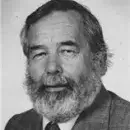
John Garcia
John Garcia was a psychologist, best known for his research on conditioned taste aversion (also called the Garcia Effect). Born into a farm family in rural California, he worked as a farmer, a cartoonist, a ship fitter, an Air Corps cadet, an amateur boxer, and a high school teacher before pursuing an academic career.
During World War II he worked on submarines for the U.S. Navy, and then served as an intelligence officer in the Army Air Corps. Using the G.I. Bill to pay for his tuition, he attended Santa Rosa Junior College (B.A., 1948) and the University of California, Berkeley (M.A., 1949; Ph.D., 1965). He served as an assistant professor at California State University at Long Beach, a lecturer in the Department of Surgery at Harvard Medical School, professor and chairman of the Psychology Department at the State University of New York at Stony Brook, Professor of Psychology at the University of Utah, and Professor of Psychology at the University of California, Los Angeles.
Starting at the U.S. Naval Radiological Defense Lab in San Francisco in 1955, he began to study the reaction of the brain to ionizing radiation in a series of experiments on laboratory animals, primarily rats. Garcia noticed that the rats avoided drinking water when in radiation chambers, and suspected that the rats associated the taste of the water (either sweetened or unsweetened) with later nausea from radiation sickness. He showed that rats could form strong aversions to tastes associated with later illness–something classical conditioning models of the time maintained required more immediate reinforcement. Garcia also discovered that the rats developed aversions to tastes, but not to sights or sounds, disproving the previously held theory that any perceivable stimulus (light, sound, taste, etc.) could condition new behaviors. These discoveries led to sharp scientific battles with behaviorist psychologists (who insisted that any stimulus could be equally associated with any unconditioned response), a fight Garcia eventually won after years of professional marginalization and personal attacks.
His findings on taste aversion fundamentally changed the understanding of associative learning and had a profound effect on the field of psychology, for which he received the American Psychological Association’s Award for Distinguished Scientific Contributions to Psychology in 1979.